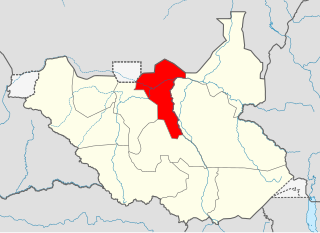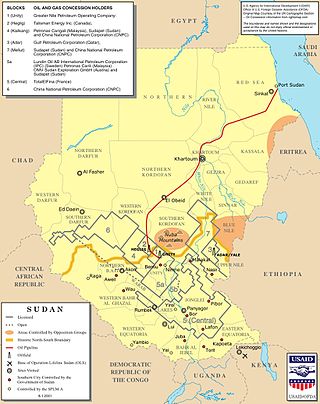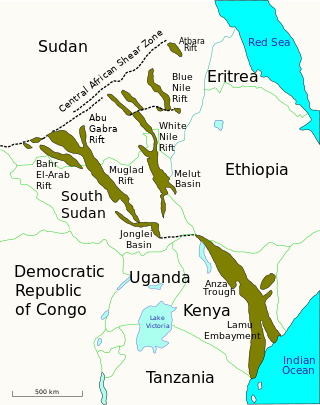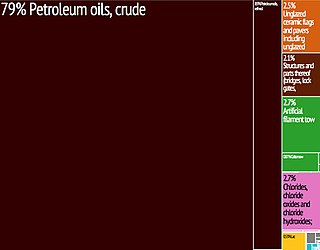
The economy of Sudan has boomed on the back of increases in oil production, high oil prices, and large inflows of foreign direct investment until the second half of 2002. GDP growth registered more than 10% per year in 2006 and 2007. From 1997 to date, Sudan has $30.873 billion by gross domestic product as of 2019, and has been working with the International Monetary Fund (IMF) to implement macroeconomic reforms, including a managed float of the exchange rate. Sudan began exporting crude oil in the last quarter of 1999.

Unity State, also known as Western Upper Nile, is a state in South Sudan. Unity State is in the Greater Upper Nile region. Unity is inhabited predominantly by two ethnic groups: the Nuer majority, and the Dinka minority.

PetroChina Company Limited is a Chinese oil and gas company and is the listed arm of state-owned China National Petroleum Corporation (CNPC), headquartered in Dongcheng District, Beijing. The company is currently Asia's largest oil and gas producer and was China's second biggest oil producer in 2006. Traded in Hong Kong and New York, the mainland enterprise announced its plans to issue stock in Shanghai in November 2007, and subsequently entered the constituent of SSE 50 Index. In the 2020 Forbes Global 2000, PetroChina was ranked as the 32nd-largest public company in the world.

The China National Petroleum Corporation (CNPC) is a major national oil and gas corporation of China and one of the largest integrated energy groups in the world. Its headquarters are in Dongcheng District, Beijing. CNPC was ranked fourth in 2022 Fortune Global 500, a global ranking of the largest corporations by revenue.
Heglig, or Panthou, is a small town at the border between the South Kordofan state of Sudan and the Unity State in South Sudan. The entirety of Heglig is claimed by both Sudan and South Sudan, but administered by Sudan. The area was contested during the Sudanese Civil War. In mid-April 2012, the South Sudanese army captured the Heglig oil field from Sudan. Sudan took it back ten days later.
The Greater Nile Petroleum Operating Company (GNPOC) is a petroleum exploration and production company operating in Sudan. It was incorporated on 18 June 1997 and undertook construction of the Greater Nile Oil Pipeline which links Sudan's inland oil fields with refineries at Khartoum and Port Sudan.
The White Nile Petroleum Operating Company (WNPOC) is a petroleum exploration and production company operating in Sudan. It was incorporated in 2001. Production is expected to increase to 500,000 barrels of oil per day by the end of 2006, following the completion of a pipeline in April 2006 linking South Sudan's oil fields to Khartoum and Port Sudan.

The Abyei Area is an area of 10,546 km2 or 4,072 sq mi on the border between South Sudan and the Sudan that has been accorded "special administrative status" by the 2004 Protocol on the Resolution of the Abyei Conflict in the Comprehensive Peace Agreement (CPA) that ended the Second Sudanese Civil War. The capital of the Abyei Area is Abyei Town. Under the terms of the Abyei Protocol, the Abyei Area is considered, on an interim basis, to be simultaneously part of both the Republic of South Sudan and the Republic of the Sudan, effectively a condominium.

The Greater Nile Oil Pipeline is an important oil export pipeline in Sudan. It extends for approximately 1,600 kilometres (990 mi) of which approximately 1.8 kilometres is submarine. It was constructed by the Greater Nile Petroleum Operating Company (GNPOC) and commenced operation in 1999. It is operated by the China National Petroleum Corporation (CNPC) which is a 40% stakeholder in GNPOC.

The Muglad Basin is a large rift basin in Northern Africa. The basin is situated within southern Sudan and South Sudan, and it covers an area of approximately 120,000 square kilometres (46,000 sq mi) across the two nations. It contains a number of hydrocarbon accumulations of various sizes, the largest of which are the Heglig and Unity oil fields. During the 1960s and 1970s, Chevron made the first oil discoveries in the basin near the towns of Bentiu, Malakal, and Muglad. Taken together, the Muglad and Melut rift basins account for the majority of Sudan's known oil reserves.
The PetroDar Operating Company Ltd is a consortium of oil exploration and production companies operating in Sudan with its headquarters in Khartoum. The consortium was incorporated in the Virgin Islands on 31 October 2001. PetroDar is composed of the China National Petroleum Corporation (CNPC), Petronas of Malaysia (40%), Sudapet of Sudan (8%), SINOPEC of China (6%), and Egypt Kuwait Holding Company through its subsidiary Tri-Ocean Energy of Kuwait (5%).

The petroleum industry in Western Australia is the largest contributor to the country's petroleum exports. Western Australia's North West Shelf (NWS) is the primary location from which production originates. Oil exports are shipped from Port Hedland.

The Blue Nile Basin is a major geological formation in the northwestern Ethiopian Plateau formed in the Mesozoic Era during a period of crustal extension associated with the break-up of Gondwana, and filled with sedimentary deposits. The modern Blue Nile river cuts across part of the sedimentary basin.

Stephen Dhieu Dau Ayik is South Sudanese politician, banker by profession, and financial technocrat. He is a proven professional and held various cabinet positions in the Government of the Republic of South Sudan. He is a senior member of Sudan’s People Liberation Movement (SPLM) and had served in various cabinet positions. Stephen Dhieu Dau was the Minister of Finance and Planning until March 2018 in the RSS. He served as Minister of Petroleum and Mining and Minister of Commerce and Industry. Stephen Dhieu Dau is from Melut County, Upper Nile State, and belongs to the Nyiel section of the Padang Dinka ethnic group. In October 2022, President Salva Kiir appointed Stephen Dhieu Dau as the chairperson of the Board of Directors of the National Revenue Authority. In December 2022, He was appointed as a member of the SPLM Political Bureau.
Melut is a community in the Upper Nile state of South Sudan, headquarters of Melut County.
Melut County is an administrative area in the Upper Nile State.

The Adar oilfield, also known as the Adar Yale, Adar Yeil or Adaril field, is an oilfield situated in the Melut in South Sudan estimated to contain about 276 million barrels (43,900,000 m3) of oil. The Chevron Corporation discovered the Adar Yale field in 1981, shortly before the start of the Second Sudanese Civil War (1983–2005). Soon after Chevron had suspended operations in 1984, Sudanese government troops began attacking civilian settlements in the area, burning the houses and driving the people away, and in the late 1990s, Nuer militias from Nasir helped the army in clearing away the people to make way for the roads and infrastructure of the oilfield.

The East African Crude Oil Pipeline (EACOP), also known as the Uganda–Tanzania Crude Oil Pipeline (UTCOP), is a 1,443 km crude oil pipeline in planning since 2013, with a foundation stone nominally under construction since 2017 and intended to transport crude oil from Uganda's Tilenga and Kingfisher oil fields to the Port of Tanga, Tanzania on the Indian Ocean.

Chad maintains sizable reserves of crude oil which, alongside agriculture, makes up the largest share of the landlocked former French colony's export revenue. Producing around 100,000 barrels of oil a day, most of Chad's crude comes from its reserves in the Doba Basin in southern Chad where oil was discovered in the early 1970s by foreign drillers. There is an estimated one billion barrels of oil in Chad, most of it being exploited by hundreds of rigs operated by Western companies such as Exxon-Mobil and Royal Dutch Shell. However, many challenges exist to Chad's petroleum industry including but not limited to corruption, internal conflict, and geography. Since Chad is landlocked, most of Chad's oil exports are transported out of the country by a pipeline that leads to the Cameroonian port city of Kribi. This pipeline, owned by a consortium, has come under fire due to allegations of exploitation by international corruption watchdogs, and Chadian politicians. In addition, environmentalists have voiced their concerns over the pipeline's impact on the natural environment, citing several spills.
The petroleum industry in Sudan began in 1979, when the first commercial flow in the country occurred.











